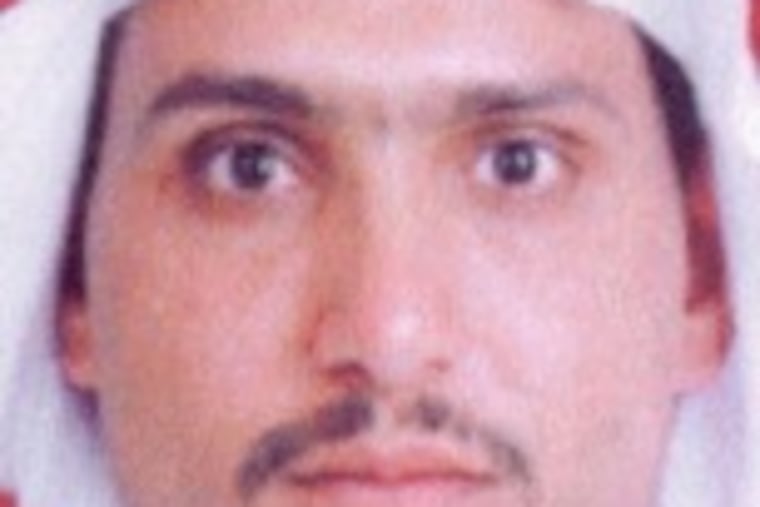Al-Qaeda in Iraq leader dead?
Officials were cautious on Iraqi reports of the demise of the shadowy successor to Zarqawi.

BAGHDAD - U.S. and Iraqi officials chased reports yesterday that the leader of al-Qaeda in Iraq had been killed by rivals north of Baghdad. U.S. authorities urged caution and warned that even if the reports were true, the death of the shadowy Abu Ayyub al-Masri was not likely to spell the end of the al-Qaeda movement in Iraq.
Reports of Masri's death emerged from the Interior Ministry, which said he was gunned down by rivals in his movement yesterday at a bridge near Lake Tharthar just north of Baghdad, where the U.S. military believes al-Qaeda operates camps.
But later, a ministry spokesman, Brig. Gen. Abdul-Karim Khalaf, said Masri's death had not been confirmed. Another senior official, Maj. Gen. Hussein Kamal, said, "We are trying to investigate and confirm the report."
Other Iraqi officials said that word of the purported death came from an informant and that efforts were under way to retrieve the body. They spoke on condition of anonymity because the information was sensitive.
An al-Qaeda front organization denied that Masri, an Egyptian also known as Abu Hamza al-Muhajer, had been killed. The Islamic State of Iraq said in a Web statement that Masri, who has a $1 million bounty on his head, was "alive and still fighting the enemy of God."
But the statement, posted on an extremist Web site, offered no evidence to support the assertion. Masri assumed leadership after his predecessor, Abu Musab al-Zarqawi, was killed in a U.S. air strike last June.
Late yesterday, the leader of a Sunni Arab group opposed to al-Qaeda told Iraqi television that his fighters had tracked down and killed Masri along with seven of his aides, two of them Saudis.
"Eyewitnesses confirmed his death, and their corpses are still at the scene," said Abdul-Sattar al-Rishawi, head of the Anbar Salvation Council.
Iraqi officials have released similar reports about the killing or capture of top insurgent figures, only to acknowledge later that the claims were inaccurate. With the Iraqis' track record, U.S. officials advised caution.
"We've heard the report on al-Masri," Defense Secretary Robert M. Gates said. "We're trying with the Iraqis to confirm whether or not it's true. I think we don't know the answer to that at this point."
U.S. Ambassador Ryan Crocker said Masri's death would be a positive development, but he played down suggestions it would spell the end of the al-Qaeda threat in Iraq.
"I would not expect it to in any way bring to an end al-Qaeda's activities in Iraq," he said. "My sense is that it is now a very decentralized terrorist effort, so while removing its current head would be a good and positive thing, I think we have to expect that we will need to continue dealing with further al-Qaeda attacks."
The reports of Masri's death come as al-Qaeda is in a violent struggle with other Sunni insurgents angry over its effort to dominate the movement and over the role of foreigners in the network.
More than 200 Sunni sheikhs in Anbar province have decided to form a political party to oppose al-Qaeda.
Clashes have erupted between al-Qaeda and other insurgent groups, notably the nationalist 1920 Revolution Brigades and the Islamic Army in Iraq, in at least three provinces, U.S. officers say.
According to associates in Afghanistan, Masri has been involved in Islamic extremist movements since 1982, when he joined Islamic Jihad, a group led by Ayman al-Zawahiri, who became Osama bin Laden's chief deputy.
Witnesses: Officer OKd Buying Hussein Cigars
A U.S. officer accused of aiding the enemy
let detainees use his cell phone to make unmonitored calls and approved buying Cuban cigars for Saddam Hussein,
witnesses testified yesterday in Baghdad.
The testimony came on the final day of a hearing to determine whether Lt. Col. William H. Steele, 51, of Virginia, a former military police commander at the Camp Cropper prison, must stand trial on various charges. Aiding the enemy, the most serious charge, can carry the death penalty.
Nine military witnesses testified yesterday, most by phone from the United States.
Special Agent John C. Nocella said Steele
let Iraqi detainees use his cell phone for unmonitored calls from the prison. During conversations in February, Nocella testified, Steele said that "what I have done is wrong" and "I will lose my commission for this."
Two witnesses also said Steele violated military rules by approving the use of U.S. funds to buy Cuban cigars for Hussein.
- Associated Press
EndText